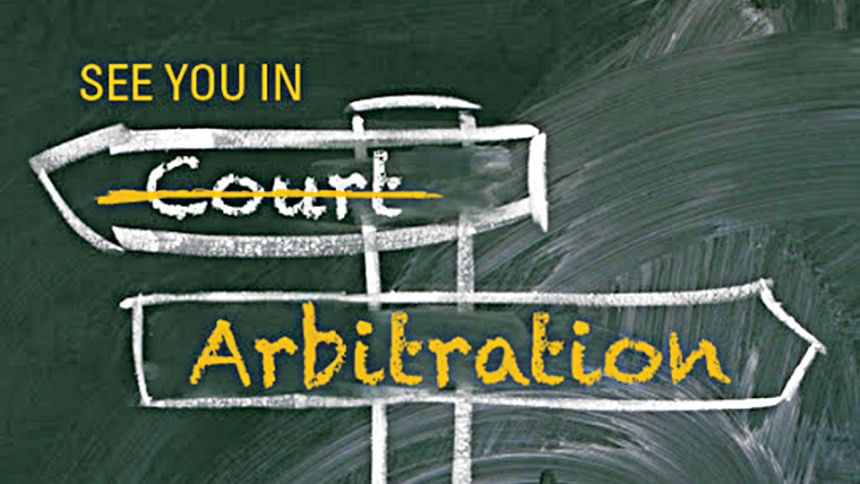Covid-19: Time to introduce virtual ADR

In Bangladesh, ADR practices that consist of mediation, arbitration, conciliation, traditional salish and NGO modified salish can be broadly grouped into three groups – formal or judicial ADR practice, quasi-formal ADR practices, and informal ADR practices. Formal ADR practices include arbitration or mediation under the Code of Civil Procedure (Amendment) Act, 2003 or under the Money Loan Court Act, 2003 or under the Muslim Family Laws Ordinance, 1961 or the Family Courts Ordinance, 1985. ADR that takes place under the Conciliation of Dispute (Municipal areas) Board Act, 2004 or under the Arbitration Act, 2001 or the Village Court Act, 2006 or the Labour Code, 2006 can be considered as quasi-formal ADR. However, traditional salish, NGOs modified salish can be considered as informal ADR practices. Besides these, the Contract Act 1872, the Specific Relief Act 1877, the Bank Companies Act 1991, the Chittagong Hill Tracts Dispute Settlement Commission Act 2001 either explicitly or implicitly refer to ADR practices.
To introduce phone-based ADR, it is understandable that only access to a land phone or a mobile phone will be enough for parties to participate in mediation or arbitration. Many countries have already started this practice. For example, being funded by the Australian Government under the Family Support Program (FSP), Queensland province of Australia initiated Telephone Dispute Resolution Service (TDRS) in 2007. Providing telephone-based mediation needs some specific set of skills connected with telephone environment. We need to provide training to our mediators to those specific issues. For instance, employees working in TDRS receive training as to their appropriate behaviours with co-mediators during telephone environment, rapport building techniques during phone conversation, active listening, controlling language, time management, interpreting silences and taking notes at the same time. Besides, conducting telephone based mediation also needs to take into account that telephone calls might face call drop or unintentional interruption deriving from micro level household issues of the participants (e.g. necessity of immediate attention to a child, finding out any undisclosed person in the room, etc.). The telephone-based family mediators, community mediators or workplace mediators in Bangladesh must also be taught or given training about how to deal with the above stated issues.
For online or internet-based virtual mediation, two kinds of internet-based communication methods are possible to apply: synchronous communication and asynchronous communication. Synchronous technology refers to conversation in real time through using web-based technologies which support online calls or video conferences. An asynchronous communication refers to communication via email. Both methods of communication can be employed for establishing online-based ADR system.
Before wide range introduction of these methods and mechanisms in Bangladesh, it would be wise to conduct some studies on similar methods which have been introduced globally by others. For instance, the World Intellectual Property Organisation (WIPO) introduced online dispute settlement system for domain name disputes and intellectual property related disputes (WIPO e-ADR). Online dispute settlement systems also exist for online consumer purchases that take place through e-commerce sites. In addition to the just mentioned instances, there are also instances of online arbitration and mediation under the Virtual Magistrate and Online Ombudsman programmes of the USA. Besides these, there are number of private initiatives which provide online dispute resolution services across the world.
All of the above-mentioned internet-based initiatives require some common accessories or technologies which must contain a delivery mechanism, a receiving mechanism, and a medium of discussions. Sometimes it may also be essential to have facilities of video conferencing. It is essential that all parties to the mediation or arbitration or conflict coaching also have access to email for conducting initial communication. Hence, the technologies essential to avail or run online based dispute resolution may involve – internet, intranets, desktop or smartphone, video conference service providing app or technology or satellites. Since all these technologies are moderately available here, it will not be a difficult task – at least from technological point of views – to initiate and popularise virtual ADR services in Bangladesh.
Till date, experts are unable to predict when the necessity of maintaining physical distancing rules will end. Considering the ongoing pandemic, we all have to be prepared for such a 'new normal' scenario that might help ourselves protecting from Covid-19. For ADR practitioners, it means we might require avoiding face-to- face meeting for an indefinite period of time. Hence, as like as other countries of world, the ADR practitioners of Bangladesh should also immediately shift their focus to virtual modes of ADR.
The writer is Advocate of the Supreme Court of Bangladesh.

 For all latest news, follow The Daily Star's Google News channel.
For all latest news, follow The Daily Star's Google News channel. 



Comments